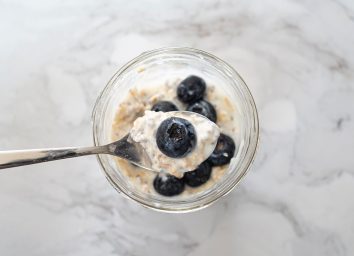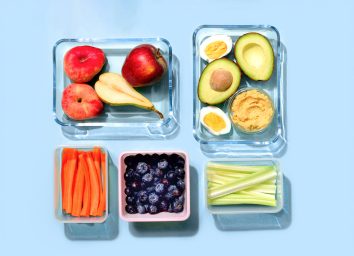20 Ways To Be Healthier by the End of the Month

You don’t inhale cigars. Vodka isn’t your breakfast beverage. You eat your vegetables. And you walk every day. You’re healthy! Happy New Year!
But admit it: We can ALL be health-IER. So, let’s start the year off right by trying these 20 easy ways to be a little healthier before Groundhog Day.
Ready? Set. Go! And for more on how to eat healthy, don’t miss 7 Healthiest Foods to Eat Right Now.
Do this every morning.
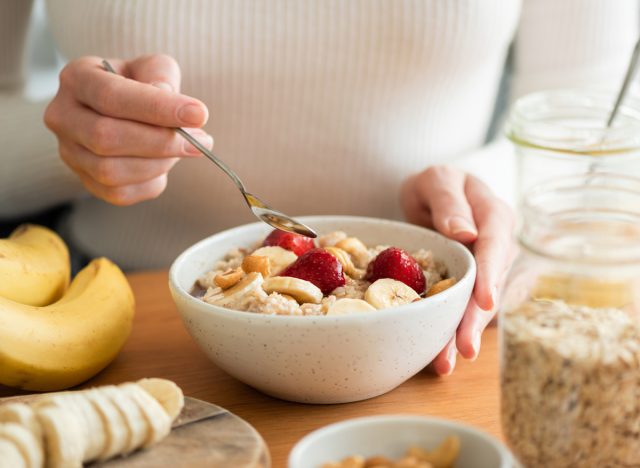
Eat breakfast to jumpstart your metabolism and prevent you from falling into an unhealthy habit. “If you’re hungry and you haven’t had any breakfast, it’s likely you will choose the easiest, most convenient food,” says nutritional psychiatrist Uma Naidoo, MD, author of This is Your Brain on Food. This may lead you to a fast-food restaurant rather than a healthier option.
“Eating breakfast will leave you satiated until lunchtime and will set you up for nutritional success throughout the entire day,” says Dr. Naidoo.
Open the refrigerator by 8 a.m.

Try to eat breakfast before 8:30 a.m., and you may reduce your risk of type 2 diabetes. A study presented to the Endocrine Society in 2021 looked at data on more than 10,000 adults and found that people who started eating earlier than 8:30 a.m. had lower blood sugar levels and less insulin resistance than people who ate food later in the day.
Learn some of the scientific reasons that may be behind your weight gain by reading about these less than stellar eating habits that can make you fatter.
Start drinking yogurt.
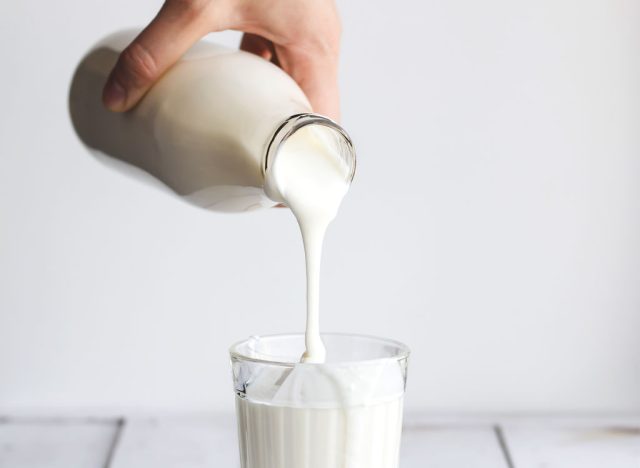
Kefir is a fermented milk drink, like a drinkable yogurt, that contains more good bacteria than yogurt does. These probiotics are known to reduce the body’s inflammatory response.
One study found that eating probiotic foods shortened the duration of colds by two days and reduced the severity of symptoms by 34%. By helping maintain the balance of beneficial bacterial in the digestive system, kefir may lower blood pressure, too. A study in the journal Nutrients involving people with metabolic syndrome found that drinking kefir regularly significantly reduced blood pressure and fasting insulin.
Walk this way.
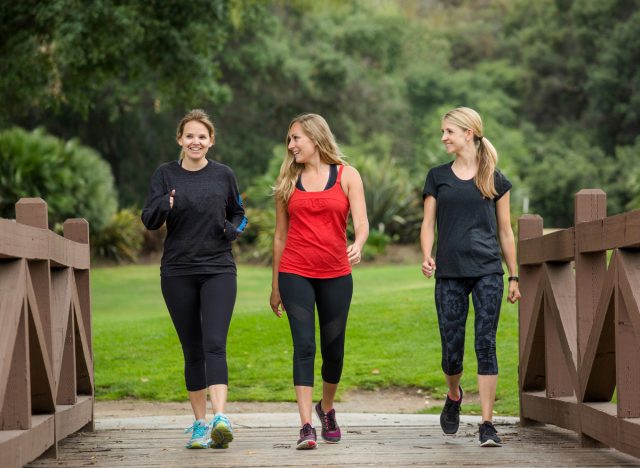
Trying to go from being sedentary and unhealthy to a marathon-running athlete can seem like a very long journey, and people often get discouraged or demotivated by the task. But you don’t have to go from zero to one hundred to reap the benefits of moving your legs.
Simply going for a 20-minute walk every day can have a significant impact on your overall health. “Doing this one simple thing will help you lose weight, give you more energy, protect against heart disease and reduce stress,” says registered dietitian Janet Coleman, RD, with TheConsumerMag.com.
Practice your A,B, Cs.
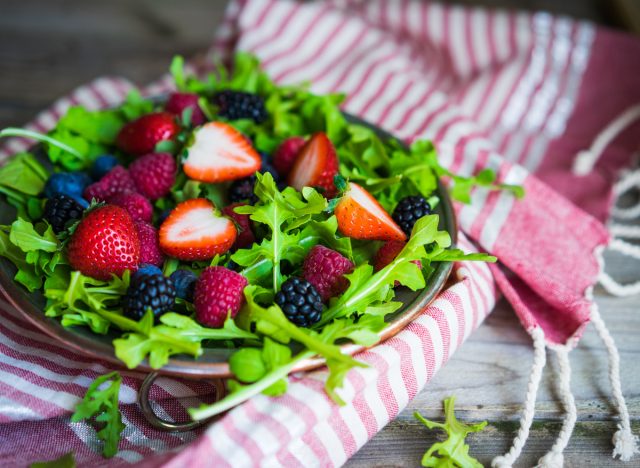
With all the processed and packaged foods at our every turn, it’s easy to go through most of the day without consuming something fresh and plant-based, and full of healthy nutrients. As a reminder, ask yourself every noontime: “Have I had my A, B, Cs today?”
- A is for Almonds, Apples, Arugula.
- B is for Berries, Broccoli, and Beans
- C is for Carrots, Cauliflower, and Coffee
All of these foods are rich in one or more antioxidants like vitamins A, C, D, E, beta-carotene, lycopene, lutein, and selenium that protect and repair our DNA, says William W. Li, MD, a scientist-physician and author of Eat to Beat Disease: The New Science of How Your Body Heal Itself.
Act like superman.
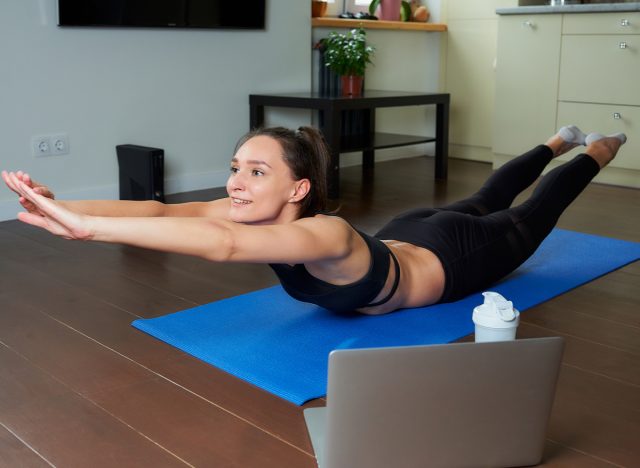
Sore back from sitting all day? Do the Superman stretch at the end of every day. Lie face down on the floor with your arms and legs extended as if you were flying over Gotham City. Now raise your hands and legs so that only your hips remain in contact with the floor. Hold that position for three seconds, lower, and repeat for 10 reps.
Chew your smoothie.
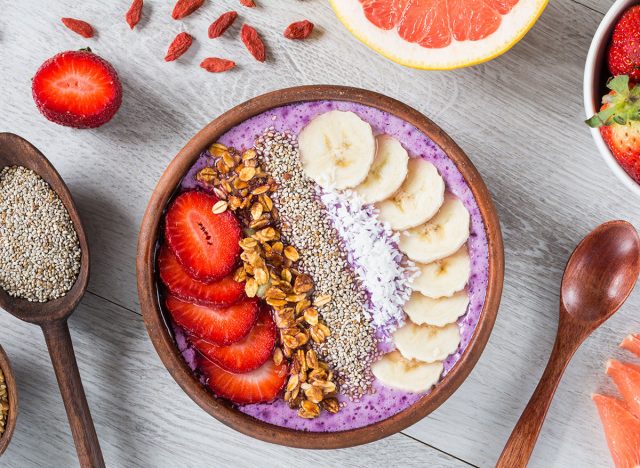
According to a recent Scientific Reports study, simulating “chewing” your drink may help you burn more calories than sipping it! Men were told to either keet a fluid in their mouth for 30 seconds to fully experience the taste of it before swallowing or were asked to stimulate “chewing” the drink. The result? Holding the liquid food in the mouth longer by tasting and chewing significantly increased their ability to burn calories directly after a meal over simply swallowing the fluid, leading the researchers to hypothesize that slowing down your eating (and chewing your food thoroughly) boosts calorie expenditure and may be effective for preventing overweight and obesity.
Mop your floor and dust the furniture.

When you can’t get to the gym, pick up a mop. Cleaning the floor, vacuuming, dusting, doing the dishes and the laundry are all physical activities that can boost your heart rate like traditional exercise. An Indiana University study looked at the relationship between physical activity levels in older Americans and their residential environments and found that the tidier the home, the more exercise the residents got. Want to be healthier in a month? Clean the garage already!
Exercise outside more often.

We’ve nothing against sweating in spin class or running on that treadmill in your basement, but if you want a better boost to your mental health, get outside for some fresh-air exercise. An analysis of studies presented in the journal Environmental Science & Technology suggests that exercising in the natural world (think grass, trees, birds, bees) compared to indoor exercising, offers greater feelings of revitalization and energy, and decreased tension, anger, and depression. Overall, participants in the studies said they enjoyed exercising outdoors more than indoors and admitted that because of that they were more likely to do it again.
Drink before you eat.

Water, that is, not martinis. Drink a glass of water before you take your first bite, says nutritionist Ilana Muhlstein, RD, author of You Can Drop It! How I Dropped 100 Pounds Enjoying Carbs, Cocktails & Chocolate—and You Can Too! Drinking water before eating is one of the first principle of her diet plan. “Water first is all about taking advantage of the simplest-yet perhaps the most powerful—form of nutrition we have and the secret weapon for dropping pounds,” says Muhlstein. “Most people don’t drink enough water throughout the day, even though it is the secret weapon for dropping pounds.” Consider starting with one glass and working toward downing two before meals. A study in Obesity found that obese people who drank two glasses before each meal dropped an extra 4.5 pounds in 12 weeks.
Eat with your eyes.
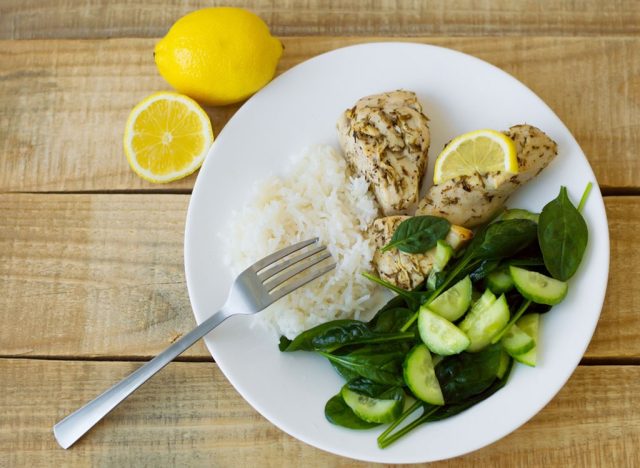
Controlling your meal portions is one of the most effective methods for losing weight because it efficiently cancels out hundreds of extra calories that would otherwise go toward fat storage. There are many ways to start practicing portion control—using smaller dinner plates or measuring cups—it just takes, well, practice:
Take a vitamin D supplement.
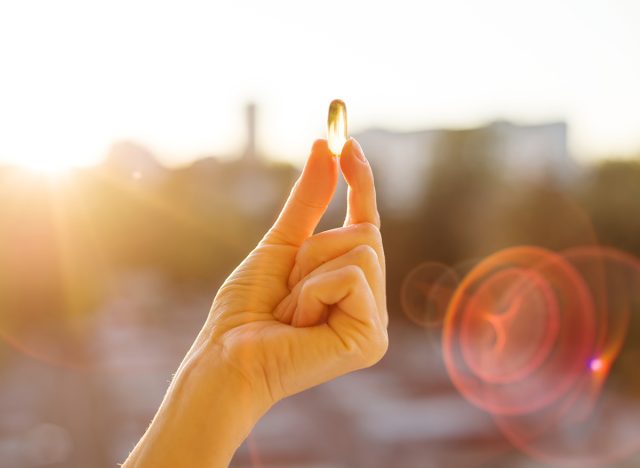
Vitamin D deficiency has been called a “global health problem.” The so-called “Sun Vitamin” plays a role in the function of more than 200 genes and is critical for growth and development. Now a new study out of Australia shows that people with vitamin D deficiency are more likely to suffer from heart disease and higher blood pressure than those with normal levels.
While we can get vitamin D from oily fish, eggs and fortified food and drink, food is a relatively poor source of vitamin D compared to sun exposure. “If we don’t get any vitamin D through the sun, this is one of the rare nutrients for which we sometimes need to take a daily supplement to keep up with the requirements,” says chief study investigator, Elina Hyppönen of the Australian Center for Precision Health, at the University of South Australia Cancer Research Institute. The recommended daily amount of vitamin D is 600 international units for people up to age 70 and 800 IU for those over 70.
Take a trip to the dentist.

Make that appointment for a dental checkup and cleaning. Your mouth, dentists say, is a window to your overall health. There are many serious health conditions that a dentist can identify by examining your teeth, gums, tongue, and throat, such as cancer, diabetes, heart disease, and even stress.
Assume this position.
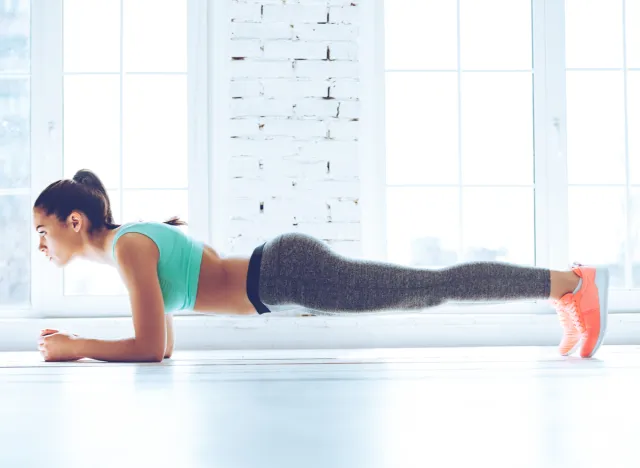
“Don’t slouch,” mom said. Did you listen? If you want to improve your posture within a month, here’s a suggestion: Do planks. This simple at-home exercise strengthens the core muscles stabilize proper alignment of the spine and support your posture when you stand, according to Jinger Gottschall, PhD, a professor of kinesiology at Penn State University who has done research on the benefits of planks. The exercise not only strengthens your abs but your shoulders and hips, too.
How to do it: Get into a pushup position and then bend your arms to support yourself on your elbows and forearms with your upper arms perpendicular to the floor. Your back should be flat from your heels to your head. Tense your whole body and squeeze your glutes. Hold the plank for 30 seconds, gradually working up to a minute.
Use your calves to help your heart.
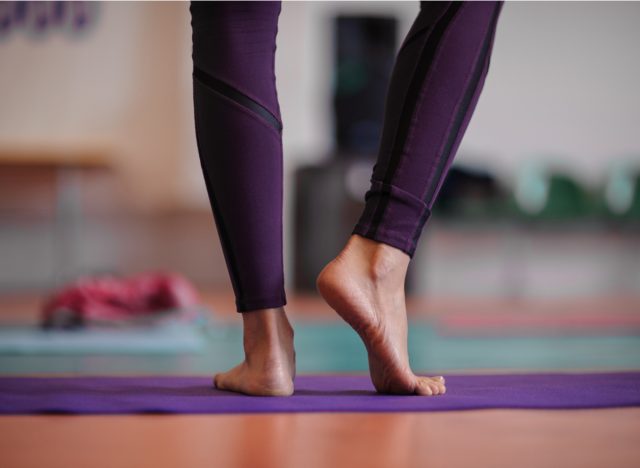
Sit all day? Join the club whose members should get up and move around at least once an hour, says cardiovascular epidemiologist Bethany Barone Gibbs, PhD, of the Gibbs Sedentary Research Lab at the University of Pittsburgh. She told Men’s Health: “One of the amazing mechanisms our body has is called the muscle pump. Every time you flex the muscles in your calves and legs, it squeezes the blood back up the veins. That’s a huge, huge load off your heart.” So, even if you can’t get away from the computer screen for a walk about the office, simply press your toes into the floor and flex your calves.
Clean out to eat clean.

Step 1. Grab a large trash bag. Step 2. Open your pantry. Step 3. Toss any and all processed foods like chips, crackers, baked goods, almost anything that comes in a box or can into that trash bag. In one fell swoop, you’ve taken a major first step in improving your health by setting yourself up for cleaner eating.
“The idea of clean eating can help to decrease additives in foods like sodium, sugar, and fat that are typically added to overly processed items,” says nutritionist Kim Pierce, RD, a certified diabetes care and education specialist and owner of The Outdoors Dietitian. Read nutrition labels and don’t eat what you can’t pronounce. “Decreasing additives will help with weight loss as you will eat less calories from those foods,” says Pierce.
Practice the watch trick.
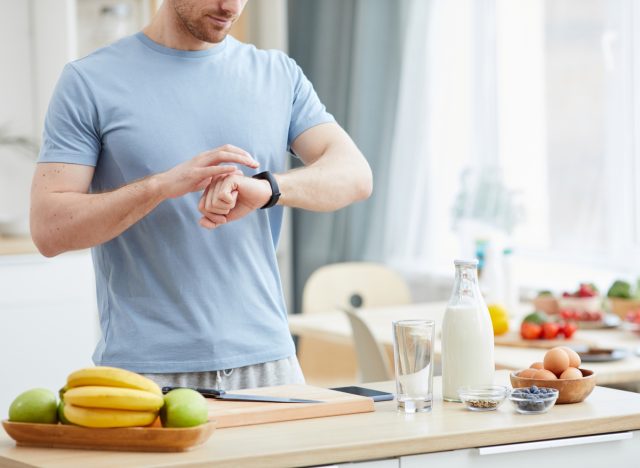
Changing your eating behavior is a great goal to accomplish in a month because it takes a little time to train yourself out of stress-related mindless munching. Self-monitoring the circumstances of your eating is as important as monitoring what you eat, say the authors of the new Johns Hopkins Press book Weight Loss for Life, Lawrence J. Cheskin, MD and Kimberly A Gudzune, MD, MPH. But recognizing what’s triggering you to reach for a doughnut is a lot harder than being aware of what you just put in your mouth. So, the Hopkins doctors recommend an awareness technique they call The Watch Trick.
Here’s how to perform it: Put a watch on your wrist. When you wear a watch, you tend to unconsciously check it throughout the day. Before you strap it on, turn it around so the face is upside down; the 12 is on the bottom and the six is on the top or, if it’s digital, the numbers are upside down. That’s your “tap on the shoulder,” your reminder to be mindful of what’s going on physically and emotionally in that moment. If you’re considering eating, it’s a gentle, but slightly annoying, reminder to determine whether your eating is being driven by physical hunger or an inappropriate eating cue like boredom or stress. If you train yourself to be aware of what’s causing your to want to eat when you’re not hungry, you can choose what to do about it. “With your new awareness of your body’s signals, you can eat without guilt because you will be eating appropriately, in response to your body’s needs,” the doctors write.
Write (and hand-deliver) a letter of thanks.

Admit it. You haven’t achieved all the success in your life through only your grit and hard work. You’ve had a little help from your friends and mentors. So, thank them. You’ll improve your own mental health through the process. That’s what the leading researcher in the field of positive psychology found. Martin E. P. Seligman, PhD, a psychologist at the University of Pennsylvania, tested his happiness theory by assigning a control group of people to write about memories of their early life. Then he asked another group to write and personally deliver a letter of gratitude to someone they had never thanked for their kindness and help. In comparing questionnaires from each group designed to gauge mood, Seligman found that those who delivered personal thank you letters immediately experienced a far greater increase in their happiness score. Your assignment to this month: hand-deliver a letter of thanks to someone who deserves your sincere gratitude.
Stand here on Wednesday mornings.
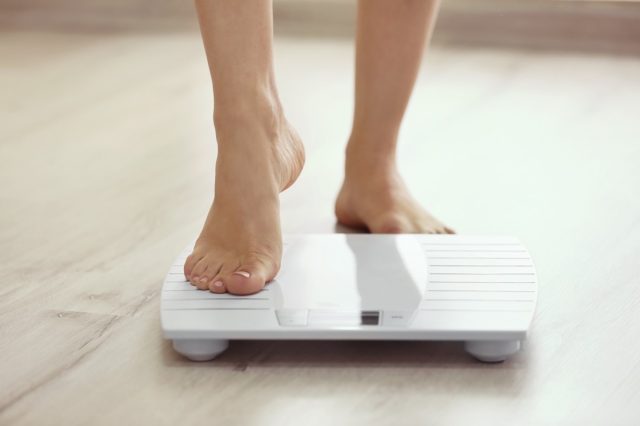
Where? On your bathroom scale. Weighing yourself weekly provides tangible feedback that can motivate healthier eating behavior, according to registered dietitian Chelsey Ludwiczak, RD. “It’s like having a weekly budget,” she told the Cleveland Clinic’s Health Essentials. If you go your budget one week, you want to know so you can fix it. If you don’t realize you’re overspending every week, it adds up.” Ludwiczak recommends you weigh yourself on the same day each week and at a consistent time because your fluctuating eating can significantly affect the number on the scale. Many experts recommend Wednesday mornings for weigh-ins because it’s in the middle of the week, away from the weekends when we are more likely to eat and drink more calories.
Sleep more, sneeze less.

Studies show that lack of sleep may significantly lower immune system strength. Researchers at the University of California–San Francisco, Carnegie Mellon University, and University of Pittsburgh Medical Center tested this theory by exposing 164 volunteers to the cold virus through nasal drops while monitoring their sleep and evaluating their health habits. It turned out that participants who slept less than five hours were four-and-a-half times more likely to catch a cold than those who regularly slept seven hours a night.
Read these next:
